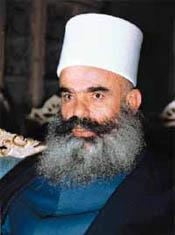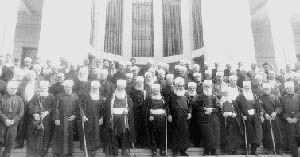 |
| Vol. 2 No. 2 | February 2000 |
 |
| Bajhat Ghaith |
The immediate objective of the legislation is to remove the acting Sheikh al-Akl, Sheikh Bahjat Ghaith, who has been at odds with Druze MP Walid Jumblatt and other pro-Syrian Druze allies. Ghaith was appointed in 1992 by his predecessor, Sheikh Mohammed Abu Shaqra, prior to his death later that year.
The Sheikh al-Akl has traditionally been appointed by Druze notables. Under the new legislation, the Sheikh al-Akl of the Druze community will be appointed by a committee comprised of the eight Druze members of parliament, all of whom have political ties with Syria. The short list of possible successors to Ghaith is said to include Nazih Aridi, Sleiman Abou Diab and Naim Hassan.
The bill is the latest development in a concerted drive by Syrian authorities to weaken the power of Druze religious leaders in favor of pro-Syrian Druze politicians. Jumblatt and other pro-Syrian Druze politicians have called for the the 1,000-year old position of Sheikh al-Akl to be eliminated entirely, but have been opposed by rival Druze MP Talal Arslan and his allies. In 1995, Prime Minister Rafiq Hariri issued a decree replacing Ghaith with a more compliant figure, Sheikh Salman Abdel-Khaleq, but reinstated him three years later under pressure from Arslan and Druze religious leaders.
 |
| Druze sheikhs protesting the endowment law in October |
1 The board consists of 26 members, 12 of whom are appointed by Jumblatt, 12 by Arslan, one by Druze MP Faysal Daoud and one by the Syrian National Socialist Party.
2 "Ghaith asks for Assad's help," The Daily Star, 13 October 1999.
3 "L'élection d'un nouveau cheikh Akl pourrait être reportée sine die Sit-in de cheikhs druzes contre le projet de réorganisation des Waqfs," L'Orient-Le Jour, 12 October 1999.